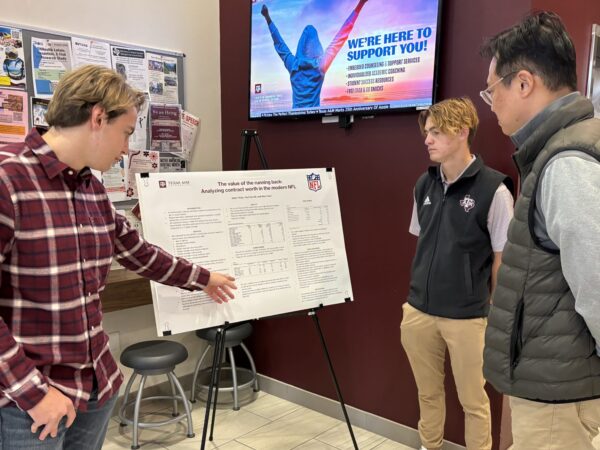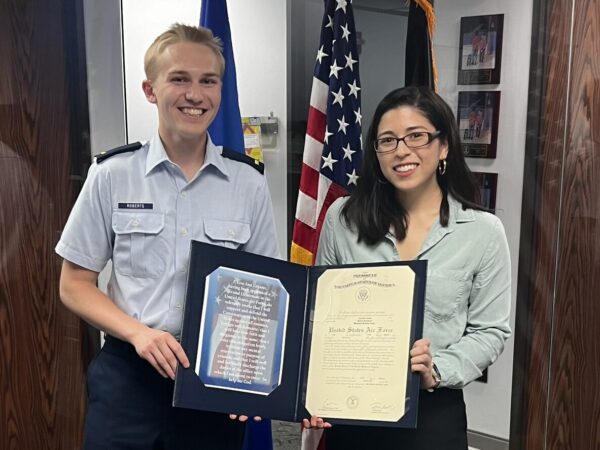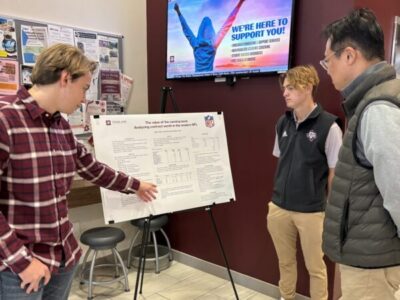Faculty Discuss Impact Of Technology On Children’s Development
For children in today’s society, technologies like smartphones and tablets are commonplace. In fact, children rely on technology for the majority of their play, spending up to eight hours each day with some sort of entertainment technology. The problem is, there is very little research on what impact those technologies have on children’s development.
A main concern about technology is the impact on a child’s fine and gross motor skills. Gross motor skills include the larger movements of the arms, legs, feet and they are involved in actions such as running, crawling and swimming. Fine motor skills involve smaller movements that happen in the wrists, hands, fingers and toes. Both skills work together to provide coordination.
“During early childhood a child needs fine motor, gross motor and physical activity. A parent should devote some time of the day or affordances in the home for the child to have that,” explained Dr. Carl Gabbard, director of the Child Motor Development Laboratory at Texas A&M. “You could argue that the iPad is beneficial for developing specific eye-hand and visual-motor skills, but its value is limited. A parent needs to provide activities such as building blocks and puzzles to help with development.”
For years, the American Academy of Pediatrics (AAP) has been stressing the importance of limiting screen time for children. Current research suggests screen time should be avoided for children under 2 years of age while children over 2 years of age should be exposed to no more than two hours of screen time per day. It was also recently published that parents who use tablets or smartphones to entertain or distract their children could be harming that child’s social-emotional development.
Dr. Jeffrey Liew, professor of learning sciences, suggests parents use the technology to engage their child socially and verbally and then connect that technology to their visual and motor skills. He says it is important for parents to not just use the technology as a tool to keep their child busy.
“I think technology is like a lot of other objects in our environment. It’s about how we use the technology and whether we’re using it to enhance our children’s development or to hinder it.”
In the classroom, Dr. Liew sees a number of advantages to help keep students active, hands-on, engaged and empowered in their learning with technology.
“Technology can be used to promote social or peer interactions and to teach children social-emotional skills such as communication, sharing and cooperation. I have observed elementary grade students in a classroom where the teacher asked them to create a story, act it out and record it using a tablet. You could really see the students’ creativity and teamwork shine through.”
The benefits also extend to students with certain developmental disabilities. For example, children with autism spectrum disorder may find certain social settings overwhelming or overly-stimulating. Using technology takes the overstimulation in terms of social interaction out of the equation.
“I think technologies can serve as both therapeutic and educational tools, depending on how they are designed and implemented,” explained Dr. Liew. “Assistive technologies and adaptive tools enable and empower children with special needs or disabilities to live, learn and achieve. Research that helps inform and improve the design and implementation of these technologies could change someone’s life for the better. It could transform lives.”
Dr. Liew and Dr. Gabbard both stress the importance of moderation and making sure children are engaged in other social activities and physical activity outside of everyday technologies. They are also calling for more developmental and educational research on best practices for technologies so they can be used to positively impact children’s learning and development.
“Mobile devices and technology could have a variety of benefits in early education, but parents’ and educators’ decisions about whether and when to integrate technologies into their homes or classrooms need to be guided by research and developmentally appropriate practices,” said Dr. Liew.
About the Writer
Ashley is the Media Relations Coordinator and responsible for news coverage in the Department of Teaching, Learning and Culture as well as the Department of Educational Psychology.
Articles by AshleyFor media inquiries, contact Ashley Green.














